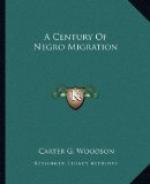An effort was made also to show that there would be no economic advantage in going to the British dominions. It was thought that as soon as the first demand for labor was supplied wages would be reduced, for no new plantations could be opened there as in a growing country like Liberia. It would be impossible, therefore, for the Negroes immigrating there to take up land and develop a class of small farmers as they were doing in Africa. Under such circumstances, they contended, the Negroes in the West Indies could not feel any of the “elevating influences of nationality of character,” as the white men would limit the influence of the Negroes by retaining practically all of the wealth of the islands. The inducements, therefore, offered the free Negroes in the United States were merely intended to use them in supplying in the British dominions the need of men to do drudgery scarcely more elevating than the toil of slaves.[l7]
Determined to interest a larger number of persons in diverting the attention of the free Negroes from the West Indies, the colonizationists took higher ground. They asserted that the interests of the millions of white men in this country were then at stake, and even if it would be better for the three million Negroes of the country gradually to emigrate to the British dominions, it would eventually prove prejudicial to the interests of the United States. They showed how the Negroes immigrating into the West Indies would be made to believe that the refusal to extend to them here social and political equality was cruel oppression and the immigrants, therefore, would carry with them no good will to this country. When they arrived in the West Indies their circumstances would increase this hostility, alienate their affections and estrange them wholly from the United States. Taught to regard the British as the exclusive friends of their race, devoted to its elevation, they would become British in spirit. As such, these Negroes would be controlled by British influence and would increase the wealth and commerce of the British and as soldiers would greatly strengthen British power.[l8]
It was better, therefore, they argued, to direct the Negroes to Liberia, for those who went there with a feeling of hostility against the white people were placed in circumstances operating to remove that feeling, in that the kind solicitude for their welfare would be extended them in their new home so as to overcome their prejudices, win their confidence, and secure their attachment. Looking to this country as their fatherland and the home of their benefactors, the Liberians would develop a nation, taking the religion, customs and laws of this country as their models, marketing their produce in this country and purchasing our manufactures. In spite of its independence, therefore, Liberia would be American in feeling, language and interests, affording a means to get rid of a class undesirable here but desirable to us there in their power to extend American influence, trade and commerce.[l9]




